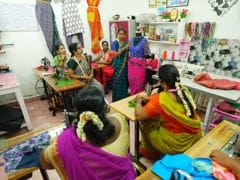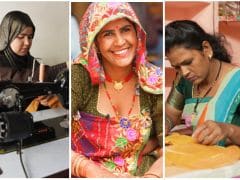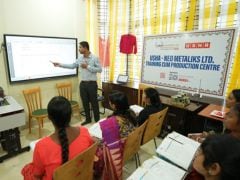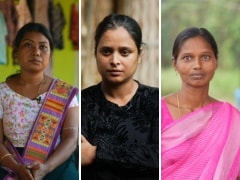- Home/
- Here's How Lajjawati From Uttar Pradesh Is Battling Gender Inequalities
Here's How Lajjawati From Uttar Pradesh Is Battling Gender Inequalities
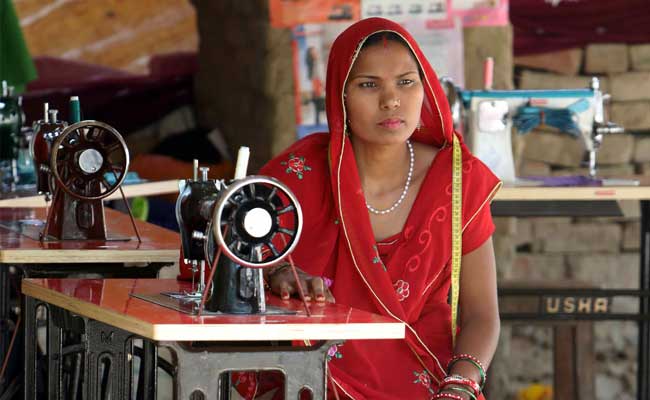
Even though I have a Bachelor of Arts, I used to live the life of an illiterate"said Lajjawati. The house we lived in was also falling to pieces. It was hard to live in it, especially, when it rained and we had to take cover under an umbrella even indoor.
Under these circumstances, Lajjawati was married off to a labourer who worked on a meager wage. Life did not get any better, for Lajjawati. The newlyweds were waging a daily battle of survival. Gradually, the financial strain intensified. From being a couple struggling to make ends meet, they were now parents, trying to cope with poverty and its related ailments that their children were suffering from. Their came a time when then had to raise money by selling their daily grocery items to foot the bills of the medicines.
Finding work was difficult and even when we did work for a couple of days, we would never get paid on time. The money would only be given to us 4-5 days late said Lajjawati.
It was at this juncture that government's Rajiv Gandhi Mahila Vikas Paiyojana that has been taking many women under its wing to help them start their own business, came to Lajjawati's rescue. The Usha Silai School, which has affiliation with the government proagramme, has deepened its network to help kick start the careers of as many women as possible simply by honing their basic skills of sewing and embroidery.
(Rajiv Gandhi Mahila Vikas Pariyojana) informed us about the Usha Silai School. They asked every woman, who knew how to sew, to join the 7-day training program, said Lajjawati.
As part of the program, women who completed the training receive the basic raw materials to start their own Silai schools.
We were each given a sewing machine said Lajjawati. I opened my own sewing center after that. Soon, I began practicing and training the women who came to learn from me.
Though, at first, it was challenging to convince the village men to allow their wives and daughter to come to her sewing center. She soon had regular students and subsequently, a regular income.
Now, it's been five years since she started her school and has trained over 60 women and young girls. Charging them each Rs 50 for a class, Lajjawati now earns approximately Rs 1500 monthly.
Having a regular source of income, Lajjawati has even managed to provide education to her children, renovate her house and expand her school by bringing in more sewing machines.
Yet, more than that, Lajjawati has changed the landscape of gender inequality in her village.
Earlier (women) did not receive the financial or education backing from others in the village she said. We had plenty of restrictions.
This changed when Lajjawati became one of the few women in the village who were self-employed. Women from her villages felt that learning sewing and stitching garments from home is a good way to earn extra income without having to actually step outside the house.
"There were times when I felt like committing suicide due to extreme poverty. But after seeing Lajjawati I was motivated to learn and joined the Silai School. Within two years I opened my own Silai School and today I have a steady income," says Babli, one of the students.
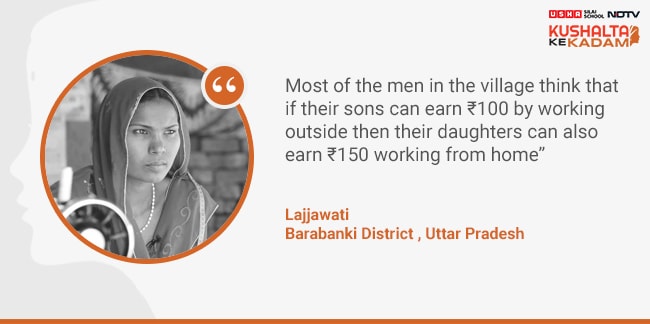
Men from her village not only allow their women to work but also encourage them to use their newly acquired stitching skills and take orders or open their own Silai School.Since I started my sewing centre, people have changed their mindset. Now we are seen the same as men who hold a job
The new era of the Barabanki district of Uttar Pradesh sees blurred lines of gender inequality where more and more working women are receiving the same respect that is given to the working men.
Also Read: After She Lost Her Son Kalpana Kamadi Decided To Reinvent Herself
also read
Threads Of Courage: Usha Silai School's Kushalta Ke Kadam Weaves Dreams Into Reality
Team NDTVStitching New Beginnings: How Usha Silai Schools Transformed Three Women's Lives
Written by Team NDTVUSHA x NDTV: From Uttar Pradesh To Bihar, Corporate Partnerships Drive Financial Freedom For Rural Women
Team NDTV
Related Stories
More- Team NDTV | Wednesday January 07, 2026
From Madhya Pradesh's stigma to Bihar's child marriages, Usha Silai School's NDTV-backed Kushalta Ke Kadam empowers women like Kalpana and Shabnam to stitch dignity and self-reliance
- Written by Team NDTV | Friday January 02, 2026
Usha Silai Schools give second chances to women like Srinagar's Marifat, who rebuilt after widowhood; Madhya Pradesh's Jyoti, escaping abuse to run her own center; and Rajasthan's Vimla, rising from child marriage to tailor and teacher. Through nine-day training, they gain sewing skills, confidence, and income proving one stitch mends lives and inspires communities.
- Team NDTV | Friday December 26, 2025
A new wave of corporate-community partnerships is equipping rural women with skills, income and confidence
- Written by Team NDTV | Friday December 12, 2025
USHAs Silai School Programme empowers women across India by turning sewing into independence. Women become trainers and leaders, transforming their lives and communities through skills, confidence, and income
Adopt a Silai School
About the Initiative

Kushalta Ke Kadam, an initiative by USHA Silai School and NDTV has entered its eighth season. The aim is to empower more women across rural India by teaching them sewing skills and helping them open new doors of opportunities for themselves. The initiative encourages rural women to become financially independent and entrepreneurs by taking up sewing and training others in their respective communities.
Since 2011, the USHA Silai School initiative has trained more than 12 lakh rural women through over 33,000 Silai schools, spanning over 20,751 villages across India.
The women earn Rs. 4,000 – 5,000 per month on an average, with the highest recorded monthly earning being Rs. 84,000 in a month. This earning works as a catalyst towards building their self-confidence, reducing gender inequities, and raising their stature within their families and in society at large.
In Pics

Rebari girls grow up learning traditional embroidery, which along with their new found sewing skills developed at Usha Silai Schools, is helping them earn a living.

Usha Silai School has empowered many rural women to support their family and send their children to school.

The Usha Silai School, established in a small nondescript village that goes by the name of Kottai, is helping empower people from varied communities.

The all-inclusive Usha Silai School Programme covers the entire nation from hamlets tucked between hills to villages cast by the sea.

Vegetables farmers from the Mizoram hills earn very little given the topography of the area. Usha Silai Schools have played an important part in this region by skilling women to financially contribute towards their households.

Usha Silai School learner Lucy has trained seven other women in her community, helping them to become financially independent.

Women like Kaviben from the nomadic Rebari community are finally laying down their roots as they begin to gain financial independence and thereby stability through Usha Silai School.

Usha Silai School, located in the Gujarat's Bhuj village, is enabling rural women to earn as much as Rs. 2,500-4,000 each month.

Usha Silai School, in association with a Gujarat based NGO called Kala Raksha, is trying to bring about a Silai revolution in Bhuj.

Besides training other women from their community, many Usha Silai School learners have become entrepreneurs in their own right.

With sewing becoming easily accessible and lucrative, the silai schools are also helping revive traditional motifs and designs.

